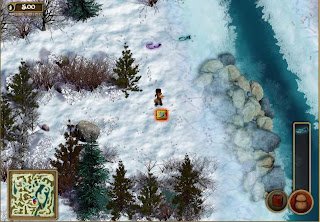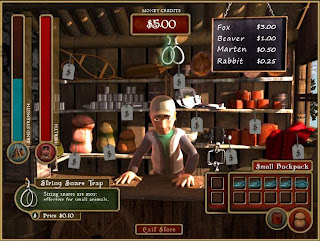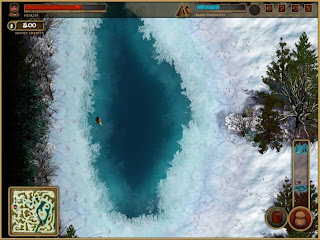The neat thing about the Trapping Game is that it involves a lot more than simply catching animals.
First of all, you need to understand animal behaviour, learn how to read animal tracks, and figure out which traps are suitable for which type of animal.
Here I’m triumphantly collecting a rabbit!
Then once you’ve got your furs, you need to negotiate the price of your pelts with the factor at the Hudson’s Bay Company trading post.
That means that not only do you need to have some pretty sharp negotiating skills, but you also need to know what’s a fair price for the different type of furs.
Here I am in deep negotiations:
Oh yes, you also have to do all this while avoiding being mauled by hungry wolverines, falling into freezing water, or starving in the frozen wilderness!
As you can see, I failed to avoid the freezing water!
We wanted the Trapping Game to be entertaining, but we also wanted it to express the cultural significance of ndoho (the Cree word for hunting, fishing, and trapping in the bush); we wanted to explore the First People’s reciprocal relationship with the land and animals.
If you’re a teacher, the Trapping Game provides a great opportunity to talk about the historical relationship between the First Peoples and the Hudson's Bay Company.You can find detailed lesson plans in our Teachers’ Guides.
Good luck trapping! We'd love to hear about your adventures!
(And hopefully you’ll have better success at avoiding the wolverine than I did!)
Collette Jackson, Content and Marketing Specialist at BlackCherry Digital Media, is writing on behalf of On the Path of the Elders, a free online educational resource that explores Cree and Ojibway history and culture, and the signing of Treaty No. 9.
Check out On the Path of the Elders at pathoftheelders.com.
For more information, email us at This email address is being protected from spambots. You need JavaScript enabled to view it.
Created in partnership with BlackCherry Digital Media, Archives Deschâtelets, the Doug Ellis Collection at Carleton University, Our Incredible World (Pinegrove Productions), the Mushkegowuk Council, Neh Naak Ko, the Archives of St. Paul University, Carleton University, and Wendy Campbell, Educational Consultant (Learning Methods Group).
This project was made possible with the support of the Department of Canadian Heritage through the Canadian Culture Online Strategy. Created with additional financial assistance from Indian and Northern Affairs Canada and the Inukshuk Fund.
Check out On the Path of the Elders at pathoftheelders.com.
For more information, email us at This email address is being protected from spambots. You need JavaScript enabled to view it.
Created in partnership with BlackCherry Digital Media, Archives Deschâtelets, the Doug Ellis Collection at Carleton University, Our Incredible World (Pinegrove Productions), the Mushkegowuk Council, Neh Naak Ko, the Archives of St. Paul University, Carleton University, and Wendy Campbell, Educational Consultant (Learning Methods Group).
This project was made possible with the support of the Department of Canadian Heritage through the Canadian Culture Online Strategy. Created with additional financial assistance from Indian and Northern Affairs Canada and the Inukshuk Fund.












